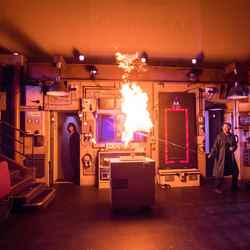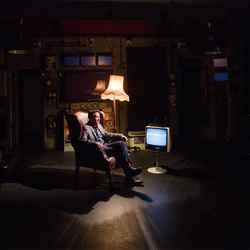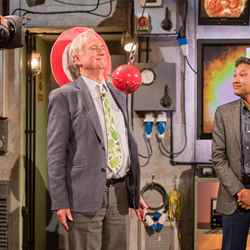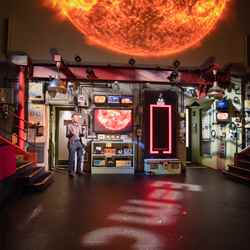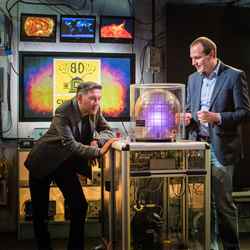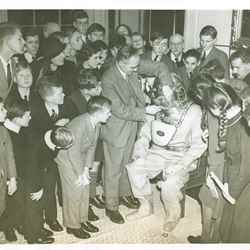Igniting a spark
This year’s Royal institution Christmas lecturer, Professor Saiful Islam, tells us about excitement, education and energy
Sometimes chemistry, just by the word ‘chemical’, can be associated with negative connotations. Unfortunately, sometimes you see the word chemical used in the media and elsewhere in the pejorative sense of ‘nasty’ or ‘dirty chemical’.
I think public engagement has an important role to play in combating this because it helps to remind people of the simple fact that we’re all made of chemicals and are surrounded by them every day. We breathe chemicals, we eat chemicals. A lot of synthetic chemicals, like pharmaceuticals, are important for our health and the clothes we wear and the dyes we have are all made of chemicals.
Science communication can educate and enlighten the public as to what chemicals and the chemical sciences are. I think it’s important to engage with the public, particularly with children and science has always got a really good story to tell. Personally I find science communication be challenging but also incredibly enjoyable.
I would definitely encourage other scientists to take part in public engagement if they have the opportunity. The cliché about learning through teaching is very true. Through promoting or talking about your own research at a different level, you begin to understand your research from a different angle.
It helps you present your research in a much more accessible manner. And with events that allow two-way dialogue, like the Bath Science Café, it’s a really good way of finding out the kind of questions the public have and sometimes you get some really curve-ball questions you wouldn’t have thought about in your research.
Often the questions are quite positive but occasionally you also find out about some of their concerns. Maybe it’s to do with nano-technology or in my case, on aspects of climate change and clean energy. On another level, my research is indirectly funded by the taxpayer through the research councils, and so I feel public engagement is important to answer their questions and explain the impact of my research.
The Royal Institution’s Christmas Lectures
It’s been a real privilege and honour to be selected by the Royal Institution to give this year’s Christmas Lectures. It means a great deal. I grew up with the Christmas Lectures and it is daunting because I’m following some great lecturers in the past – from Carl Sagan, David Attenborough, Nancy Rothwell and Richard Dawkins – to Kevin Fong on space last year. The expectations are very high so I’m quite excited, slightly terrified but hopeful that it will live up to expectations.
The overall title is ‘Supercharged: Fuelling the future’. It’s a story about something invisible, but which drives everything around us, from our bodies to mobile phones; from cars on the road to all stars in the universe…that is ENERGY.
I think it’s important that people learn about energy because it’s one of those things that is all around us, it’s part of our everyday lives. In essence it makes the universe tick, from that nuclear furnace in the sun to even the daily school run, we’re all using energy. It’s something that’s almost taken for granted.
In these Lectures we wanted to remind people of a simple scientific fact; you can’t create or destroy energy, it can only be converted from one form to another. The three Lectures will take us on a journey through these transformations to inspire the next generation of scientists. So we might be starting with the candle which is just chemical energy to heat and light or the conversion of potential energy to kinetic energy in swinging a cannonball.
The other important aspect is that there’s growing energy demand and with that there are increasing carbon dioxide emissions and use of fossil fuels. We have to move over to cleaner, greener alternatives. I’ll be talking about renewables like solar, wind, and whether can we electrify our transport, so can we have more electric vehicles. We’ll will also look at what energy usage was 80 years ago, when the Christmas lectures first started, and compare it to now and we’re going to show that there is a greater energy mix right now where renewables have grown.
To tie in with my research area we’re also going to cover energy storage. From demonstrating how a battery works with a lemon to our final Lecture where we’re going to try, live in the show, to break a Guinness world record on the largest lemon battery with the highest voltage. We’re also going to show quite a few demos on electricity like tesla coils which will be quite exciting, sparks are going to fly there! And of course you can’t have the Christmas Lectures without some bangs.
80 years of inspiration
The Ri is also celebrating the 80th anniversary since the Lectures were first broadcast on the BBC back in 1936, making it the world’s oldest science series. In this year’s series, we will share the incredible history of the Lectures by recreating some of the most memorable demos with the help of some very special guests, past Lecturers!
Ultimately I would like to ignite a spark of excitement and a deeper understanding of energy through the Christmas Lectures and all of my public engagement work. I also want children to understand that the pursuit of science is the proper way to unravel the mysteries of the world around us and is full of beauty and exciting discovery.
The 2016 CHRISTMAS LECTURES are generously supported by the Lloyd’s Register Foundation.
‘Supercharged: Fuelling the future’ will be broadcast on BBC Four on 26, 27 and 28 December and will available to watch again on BBC iplayer until the end of January. The Lectures will also be available to watch online by anyone in the UK and further afield via richannel.org, from February.

